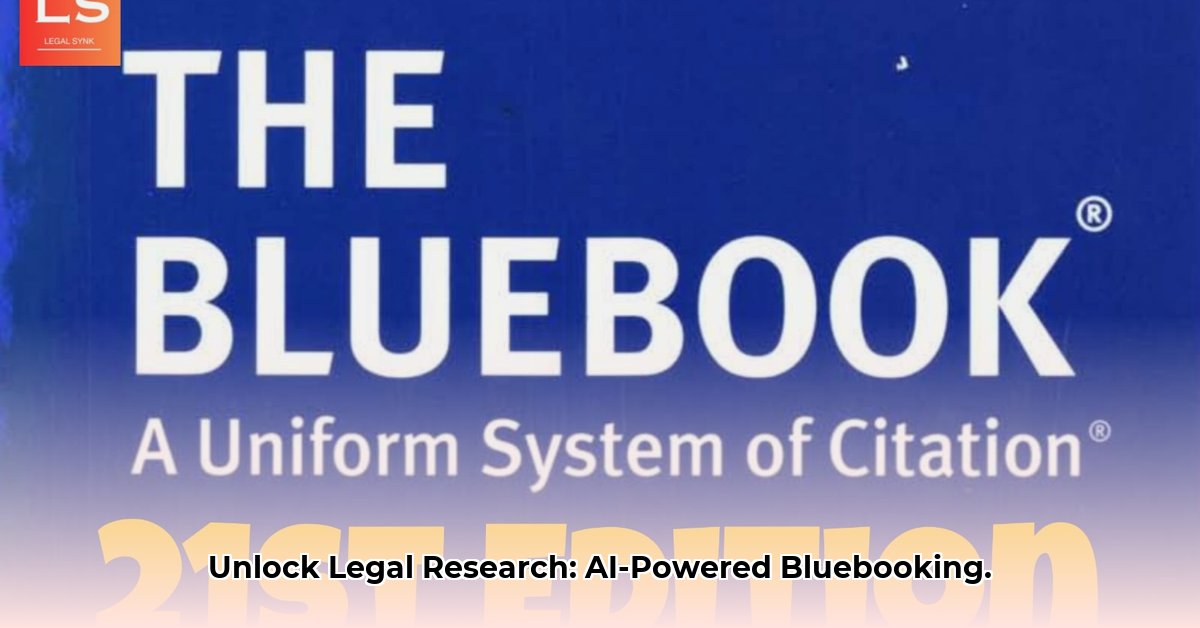
AI's Transformative Impact on Legal Research and Bluebook Citations
Legal research, traditionally a time-intensive and laborious process, is undergoing a significant transformation thanks to artificial intelligence (AI). The meticulous task of creating accurate Bluebook PDF citations, notorious for its complexity and potential for error, is now being significantly streamlined through AI-powered tools. These tools leverage machine learning to analyze vast datasets of legal documents and Bluebook citations, identifying patterns and improving both speed and accuracy. This enhanced efficiency frees legal professionals to focus on higher-level tasks such as legal strategy and client interaction. But what are the practical implications? How can legal professionals effectively utilize these tools, and what are the ethical considerations? For a quick reference, download the Bluebook here: Bluebook PDF.
Harnessing AI for Enhanced Bluebook Compliance: A Practical Guide
AI offers several key advantages in legal research and Bluebook citation:
Automated Citation Generation: AI tools can automatically generate Bluebook-compliant citations from provided text, significantly reducing manual effort and the risk of human error.
Real-time Error Detection: These tools act as advanced spell-checkers, flagging potential errors in citation formatting and accuracy. This immediate feedback loop allows for quick corrections, enhancing overall accuracy.
Style Consistency Enforcement: AI ensures consistent adherence to Bluebook rules throughout a document, eliminating inconsistencies that can arise from manual citation creation.
Time Savings: Automation dramatically reduces the time spent on citation tasks, allowing legal professionals to allocate more time to critical analysis and client communication.
Practical Steps:
Research Available Tools: Explore the various AI-powered legal research platforms to find one that best meets your needs.
Pilot Program Implementation: Begin with a small-scale project to test the tool's capabilities and integration with existing workflows.
Team Training and Education: Ensure adequate training for all team members on the tool's features and ethical considerations.
Ongoing Monitoring and Evaluation: Regularly assess the tool's performance to identify and address any potential shortcomings.
Addressing the Challenges and Ethical Considerations of AI in Legal Research
While AI offers substantial benefits, several challenges and ethical considerations must be addressed:
Accuracy Limitations: AI tools are not foolproof; human oversight remains crucial, particularly for complex legal issues. Always verify AI-generated citations and research findings.
Algorithmic Bias: AI algorithms are trained on data, and if this data reflects existing societal biases, the AI may perpetuate those biases in its outputs. Careful selection and scrutiny of training data are essential.
Data Privacy and Security: Legal research often involves sensitive information; employing AI tools requires meticulous attention to data security and privacy compliance.
Mitigating Algorithmic Bias:
Diverse Datasets: Ensuring the training data is representative of diverse populations is crucial in mitigating bias.
Transparency and Explainability: Understanding the inner workings of the AI algorithm allows for easier identification and correction of biases.
Continuous Monitoring and Auditing: Regular checks for bias in the AI's output are essential for maintaining fairness and accuracy.
The Future of AI in Legal Research: A Forecast
The future holds even greater integration of AI into legal research workflows. Expect seamless integration with existing case management systems, advanced predictive capabilities, and further enhancements in accuracy and efficiency. The legal profession's future will be inextricably linked to AI's advancement, requiring continuous adaptation and embracing of these evolving technologies.
A Balanced Perspective: Weighing the Pros and Cons
| Pros | Cons |
|---|---|
| Increased efficiency and speed | Potential for algorithmic bias |
| Improved accuracy and consistency | Dependence on technology; human oversight needed |
| Reduced manual work | Data privacy and security concerns |
| Enhanced research capabilities | Costs of implementation and maintenance |
The effective use of AI-powered tools transforms legal research, but ethical considerations and human judgment remain paramount. The future of successful legal practice lies in skillfully integrating AI's capabilities with well-trained legal professionals.
⭐⭐⭐⭐☆ (4.8)
Download via Link 1
Download via Link 2
Last updated: Sunday, April 27, 2025